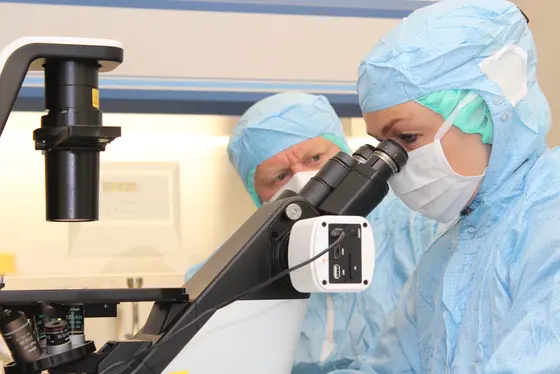How can the body fight tumors if they are invisible to the immune system? One solution to this problem involves the already established Chimeric Antigen Receptor (CAR) T cell therapy, in which a patient's T cells are modified outside the body by adding the genes for a synthetic receptor protein. This receptor is designed to recognize and attach to specific surface molecules on tumor cells. The genetically modified T cells are subsequently reintroduced into the patient where they can specifically target tumor cells.
CAR-T cell therapies have already been shown to be extremely successful in some types of blood cancer – with response rates of over 80 percent – and several CAR-T cell products have already been approved for clinical use. “A number of other areas of application are conceivable for CAR-T cells, but until now, it has been very expensive and time-consuming to produce them,“ Patrick Schmidt from NCT Heidelberg explained.
Typically, the genes for the synthetic receptor are inserted into T cells using viruses as genetic shuttles. This can have disadvantages, however: the retroviruses which are used integrate into the T cell DNA, and this could potentially lead to dangerous mutations. Transferring the genes as “naked“ DNA – known as plasmids – has not been a viable option so far, as T cells react extremely sensitively to foreign DNA molecules.
After many years of development, Matthias Bozza and Richard Harbottle from the DKFZ have now managed to construct a completely novel and patent-protected plasmid vector that is accepted by the T cells: This DNA construct does not integrate into the T cell's DNA, but instead replicates autonomously in the cell nucleus and is thus transferred to the daughter cells during T cell division.
The researchers use a particular region of human DNA to attach the vector to the matrix proteins of the cell's nucleus. They systematically refined this DNA construct, known as a nano-S/MARt DNA vector, to remove all the components of the vector that could provoke an immune reaction in the T cells. In addition, they also enhanced the efficiency with which the introduced gene is read in T cells. “By optimizing every component of the vector, we created a plasmid that is invisible to cells, and therefore it can be used to efficiently transfer genetic material into human T cells,“ explained Matthias Bozza, the first author of this study.
The nano-S/MARt vector construct can be transferred to T cells using a rapid and simple method known as electroporation. Using a semi-automated production system, the Heidelberg-based researchers managed to generate a sufficient amount of CAR-T cells, within the space of only five days, that could be used to treat patients. “That is a considerable improvement over the virus-based method, which typically takes about three weeks,“ explained Patrick Schmidt, who tested the technology as one of the two co-directors of the study.
The CAR-T cells produced using the nano-S/MARt vector proved to be more efficient at killing cancer cells than comparable cells generated using viruses. This was true both in experiments with tumor cells in a petri dish and in mice bearing tumors.
“There is great potential for using CAR-T cells and other cellular immunotherapies in oncology. The possibility of using a safer vector to manufacture large amounts of these kinds of therapeutic cells more rapidly and affordably marks a crucial step forward in harnessing the potential of this innovative form of treatment more effectively in the future,“ study co-director Richard Harbottle remarked. “The advantages of the nano-S/MARt vector system are so convincing that we can assume that our method sets a new standard in the production of genetically modified immune cells.“
Matthias Bozza, Alice De Roia, Margareta P. Correia, Aileen Berger, Alexandra Tuch, Andreas Schmidt, Inka Zörnig, Dirk Jäger, Patrick Schmidt & Richard P Harbottle: A non-viral, non-integrating DNA Nanovector platform for the safe, rapid, and persistent manufacture of recombinant T cells.
Science Advances 2021, DOI: 10.1126/sciadv.abf1333
A graphic illustrating the nano-S/MARt vector system is available here:
www.dkfz.de/de/presse/pressemitteilungen/2021/bilder/T-cell-graphical-abstract-Eng.png
Note on use of images related to press releases
Use is free of charge. The German Cancer Research Center (Deutsches Krebsforschungszentrum, DKFZ) permits one-time use in the context of reporting about the topic covered in the press release. Images have to be cited as follows: “Source: Harbottle/DKFZ“.
Distribution of images to third parties is not permitted unless prior consent has been obtained from DKFZ's Press Office (phone: ++49-(0)6221 42 2854, E-mail: presse@dkfz.de). Any commercial use is prohibited.



